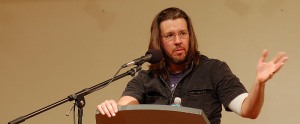There will probably come a time when our current appetite for insight about David Foster Wallace ebbs, but I don’t see that coming any time soon. I just got around to reading John Jeremiah Sullivan’s fascinating review of Wallace’s The Pale King in GQ. Sullivan is a first-rate essayist and it’s great fun to see him write about Wallace.
In reviewing The Pale King, Sullivan got my attention by focusing on something Wallace wrote in his essay on Joseph Frank’s five-volume biography of Dostoevsky (which is collected in Consider the Lobster: And Other Essays.) Wallace wrote:
“[This new] bio prompts us to ask ourselves why we seem to require of our art an ironic distance from deep convictions or desperate questions, so that contemporary writers have to either make jokes of them or else try to work them in under cover of some formal trick like intertextual quotation or incongruous juxtaposition, sticking the really urgent stuff inside asterisks as part of some multivalent defamiliarization-flourish or some such shit. Part of the explanation for our own lit’s thematic poverty obviously includes our century and situation.”
I believe this “ironic distance” has become something of a default habit for many talented writers today.It is a shame that the “really urgent stuff” concerning the human condition is often pushed to the margins of novels today.
I recently went back to Wallace’s Dostoevsky essay and he mentions spending two months immersed in the world of Dostoevsky while preparing for the essay. I can only imagine what a delight a book-length treatment of Wallace thinking about Frank and Dostoevsky would be.

2 replies on “David Foster Wallace & Lit’s Thematic Poverty”
[…] people consider it the greatest literary biography of the 20th Century. I recently came across a David Foster Wallace essay on Joseph Frank’s Dostoevsky biography where Wallace alludes to its greatness. James Joyce in […]
[…] blogged about David Foster Wallace‘s concern that writers today are ducking “the deep questions” of life a la […]